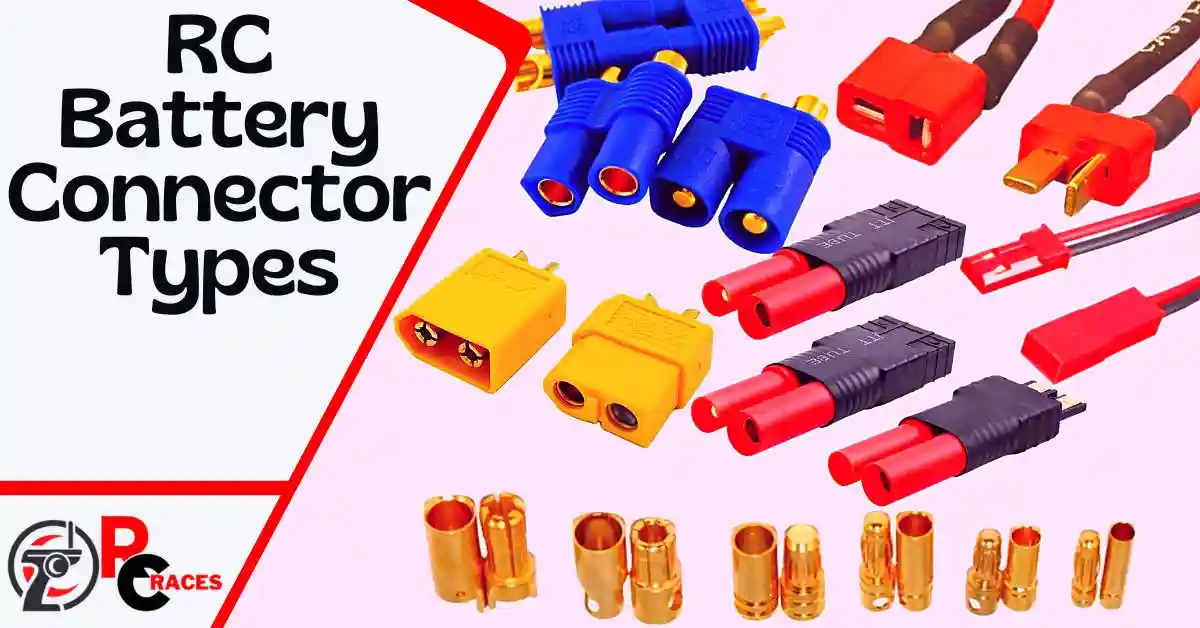The battery connector is a crucial part of RCs since it transfers electrical energy from the battery to the motor (or ESC) to run the vehicle. Unfortunately, most RC owners fall into trouble while choosing one. Each of them is different depending on the manufacturer, battery type and application. However, selecting the right one is important if you want to enjoy high performance and avoid unexpected damage.
In this article, we will go through the common types of RC battery connectors to learn about their technical features and appropriate applications.
Read and explore.
How to categorize RC battery connectors
Dozens of RC battery connectors are available in the market. So, some RC enthusiasts may wonder how they are categorized. The answer is quite simple.
Each type of connector has a different shape and Amperage rating, which can easily differentiate them. These factors also specify whether a connector suits your RC car or vehicle.
Check out the following table to get a basic idea about their differences.
| Amperage Rating of connectors | Suitable for |
| 1 to 10 Amps | Micro RCs or smaller RC vehicles. |
| 30 to 70 Amps | Medium to high power RCs. |
| 70+ Amps | Powerful RC vehicles. |
Along with the amperage rating, RC connectors can also be classified based on the shape of their male-female plugs. For example, EC, bullet, XT, T-plug and JST are common types of connectors with unique shapes.
Types of RC battery connectors
Would you like to know about each connector type in detail? Let’s go through the following sections.
1. Dean‘s T-Plug (T-Connector)
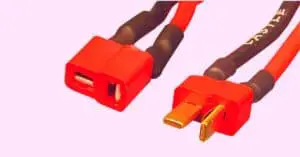
For high-performance RCs, Dean’s T-Plug or T-connector is a popular battery connector. Though small and have low resistance, they can handle high currents, which makes an excellent addition to your RC car.
Variations of T-connector:
There are two types of T-connectors for RC batteries, including:
- Mini T-Plug: A smaller version designed for smaller batteries and RCs.
- Reverse T-Plug: Designed to prevent accidental reverse polarity connection.
Appropriate applications:
- It is a very suitable connector to use in high-performance RC vehicles.
- A T-connector is appropriate when a low-resistance and secure electrical connection is required.
- They are convenient to install in tight spaces due to their small size.
- These connectors are good choices to minimize energy loss and prevent overheating during operation.
Incompatible cases:
- Deans’s T-Plugs are incompatible with some RCs requiring a different connector type.
- It may not work with some devices with particular power requirements.
- The connector is not suitable for too high or low-power RCs.
2. XT Series Connectors
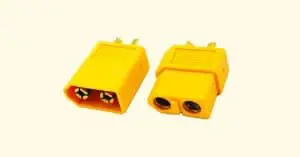
XT is a popular connector series for RC enthusiasts because of its high-current handling capability. They are reliable for a secure electrical connection for medium to high-power RC vehicles.
Variations of XT connectors:
XT connector series come with variations like the following:
- XT30 connector: (30 amps) for medium power RCs.
- XT60 connector: (60 amps) for medium power RC vehicles.
- XT90 connector: (90 amps) for high-power RC cars.
Appropriate applications:
- XT connector is a wise choice for high-performance RC vehicles.
- XT is a good option when you need a reliable connector for secure connection and to prevent energy loss.
- They are convenient for RC owners who prefer simple electrical installation, such as plug-and-play and disconnecting anytime.
- XT connectors are also better when durability is a priority, as they can tolerate harsh environmental conditions.
Incompatible cases:
- XT connectors are not designed for micro RCs. They are for medium to high-power RC vehicles.
- Matching them with other types of connectors is not possible, but you can still connect them using a specialized adapter.
- XT connectors may not be suitable in a few cases where you have a very specific power requirement for your RC.
3. EC Series Connectors
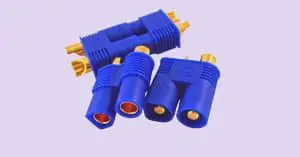
EC connectors are also called E-flite or JST-XH. Due to their small size and lightweight design, they are best suited for smaller to medium RC cars that require a steady connector.
Variations of EC connectors:
You will notice a ton of varieties in EC connectors. But below are some common types:
- EC2 Connector: (35 amps) for medium power RCs.
- EC3 Connector: (60 amps) for medium-power RC vehicles.
- EC5 Connector: (120 amps) for larger and high-power RCs.
Appropriate applications:
- EC is a favorable connector when you prioritize secure electrical connection and minimize energy loss and heat during operation.
- They are well-matched with smaller RCs where small and lightweight components are required.
- These connectors are also appropriate for repeated use and rough environment.
- EC connectors have diversities which is excellent for specific power requirements and preferences.
Incompatible cases:
- ECs with low amperage are not compatible with high-end RCs requiring larger connectors.
- They do not match with other types of RC battery connectors. However, you can connect them with a particular adapter.
- EC connectors may not be suitable for larger RC vehicles with extreme power requirements.
4. HXT Connectors
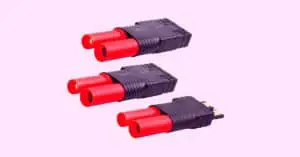
HXT connectors are designed to handle high currents. So, this connector is very common in medium to powerful RC vehicles. HXTs also provide firm connections between the battery and RCs.
Variations of HXT connectors:
The connector has several variations, including:
- HXT 3.5mm Connector: (up to 60 amps), used in medium power RCs.
- HXT 4mm Connector: (up to 100 amps), used in medium to large-sized RC vehicles.
- HXT 5.5mm Connector: (up to 150 amps), used in larger, high-power RCs.
Appropriate applications:
- HXTs are appropriate when you need a secure, low-resistance electrical connection facing repeated use and harsh conditions.
- They are also suitable if you prefer minimizing energy loss and heat buildup.
- These high-current connectors are well fitting for larger and more demanding RC vehicles.
- If you have a specific power requirement, HXTs are recommended connectors since they have various options.
Incompatible cases:
- HXT connectors are incompatible with smaller RCs with low power requirements.
- They will not work directly with other types of connectors without certain adapters.
- RC vehicles requiring a specific type of connector are not compatible with HXTs.
5. Bullet Connectors
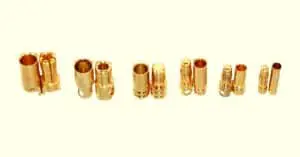
The name “Bullet connector” is inspired by its appearance. They are particularly designed for steady electrical connections. That’s why it has been a common and popular choice among RC car owners.
Variations of Bullet Connectors:
These connectors are available in different sizes and variations, including:
- 2mm bullet connectors: for small RCs.
- 3.5mm bullet connectors: for small to medium-sized RC vehicles.
- 4mm bullet connectors: for medium to large-sized RCs.
- 5mm bullet connectors: for larger, high-power RC vehicles.
Appropriate applications:
- Bullet connectors are highly appropriate when needing an immovable electrical connection, even in harsh environmental conditions.
- They are usually recommended for larger and high demanding RC vehicles.
- These connectors are good options for minimizing energy loss and heat buildup during operation.
- If you need quick installation and removal, bullet connectors are convenient.
Incompatible cases:
- Bullet connectors are usually not designed for smaller RC vehicles.
- They are incompatible with connecting with other battery connectors, such as T-Plugs and XT, without using a particular adapter.
- They do not fit specialized RC vehicles with a specific type of connector.
6. JST (PH, XH, ZH)
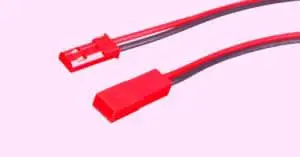
JST (Japan Solderless Terminal) RC battery connectors are designed and manufactured following the standards of J.S.T. Mfg. Co. These electrical connectors have numerous series and pitches. JST connectors are globally popular due to their smaller sizes, which are convenient for use in narrow spaces.
Variations of JST connectors:
These connectors are available in the following types:
- JST-ZH: A 1.5mm pitch connector (1 Amp) for low-power micro RCs.
- JST-PH: A 2.0mm pitch connector (2 Amp) for low-power RCs.
- JST-XH: A 2.5mm pitch connector (3 Amp) for low-power RCs.
Appropriate applications:
- JST connectors are convenient to use where the space is limited.
- They are excellent options if you want trouble-free installation requiring minimum tools.
- These connectors are well-suited for secure and reliable connection where vibration and stress are issues.
- For a wide range of batteries, JST connectors are well-fitting.
- They are appropriate for different applications and power requirements.
Incompatible cases:
- JST connectors may not be suitable for high-power RCs.
- Despite handling vibration, they are not competent for enduring extreme vibrating environments.
- JSTs are inappropriate for high-temperature use since the plastic housing can melt or be damaged.
Frequently Asked Questions
Can you connect two different types of connectors?
Technically, you cannot connect them directly due to their different shapes and sizes. Sometimes, connecting two types of connectors is impossible despite their similar-looking plugs and shells. You need to use an adapter that supports both connectors to do it.
Are XT and bullet connectors the same thing?
Though XT and bullet connectors look similar, they have subtle differences designed for different purposes. For example, XT connectors secure the connection by locking mechanism. In contrast, bullet connectors maintain a connection by friction.
How do I know if a connector is suitable for my RC?
If you are confused about whether a battery connector suits your RC, you should check the manufacturer’s datasheet. The document should provide sufficient information about the connector to ensure it is appropriate for your specific need.
Final Words
Each RC battery connector is unique and has its particular benefits and limitations. That’s why choosing the appropriate one can be very confusing, no matter whether you are a beginner or an experienced RC hobbyist.
So, before making your final selection, always research and understand the differences among the various connectors. Also, note down your specific needs and requirements to find the most suitable connector.

